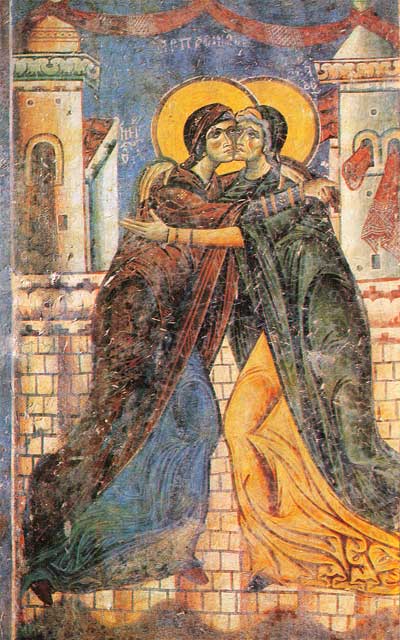
A young woman expecting a baby. An old woman six months pregnant with the child she never expected to have. Their joy. Their song. This is the sound of our salvation. It is so simple. There are no kings here, or thrones or armies clashing on a vast plain, just two women in the hill country embracing each other.
And how is this, that the mother of my Lord comes to me? Elizabeth says. For when the sound of your greeting came to my ears, the babe in my womb leapt for joy.
This babe, Elizabeth’s unexpected son, is John the Baptist, who will stride into Israel crying to the people their sin and God’s salvation. This babe is John the Baptist, who in the name of God will face down a king for his wrong-doing and die for it, John the Baptist who sees and announces the Christ.
Kings are part of this story, and other great things: good and evil, and what it means to live as God would have us live, and faith, and courage, and life and death. Great things are afoot, the power of God at work now in the child to be born, scattering the proud in the imagination of their hearts, lifting up the humble and meek. All the power of God to face down the arrogant, all the power of God to have mercy, to reach out with his great hands to the littlest ones among us and lift them up. All the power of God to save.
And where is it? Where is it found, this great day, this mighty act; where is God to be found? He is found here, in two pregnant women in the hill country and their song.
My soul magnifies the Lord! For the mighty one has done great things for me, and holy is his name.
The Visit of the Blessed Virgin Mary to Elizabeth: it is the feast of God’s grace, God’s surprising, surpassing grace, his mighty hands cradling a child and giving a young woman the song, the first song, the last song, the best song, the song that will be sung down through the ages.
Sarah and I heard it sung last week at a great cathedral in Wales. We sang it here at St. Matthew’s last Sunday afternoon, Mary’s Magnificat at our little church.
It is a just a small song that we sing here, as it was just one young woman who first sang it.
But listen!
It is sounding all over the world. In this small corner and in that, Mary’s song sounds, in the field where St. Non’s ruined sanctuary stands, weathered stone in the green grass of Wales on a cliff above the sea, St. Non who gave birth in that green field one stormy night to St. David, St. David who brought faith and healing to the people, the ordinary people of those green and storm-tossed fields; St. David, whose cathedral rises now, still, has stood for one thousand years and more, in the valley of St. David’s.
They sing Mary’s song there, in St. David’s Cathedral, of a Sunday afternoon. They sing in wild Wales on its farthest coast the song of the Christ. Because of St. Non, this young mother of the 6th century and her son, they sing Christ’s song. And we sing it with them.
My soul magnifies the Lord! And my spirit rejoices in God my Saviour. For the Mighty One has done great things for me, and holy is his name.

